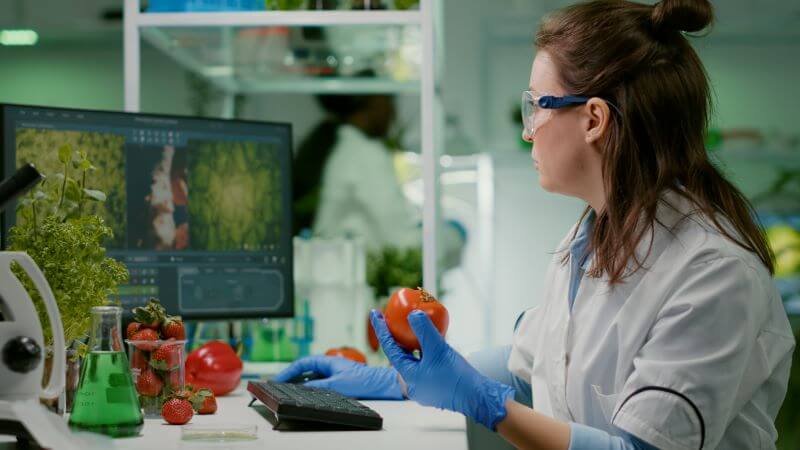Could we someday have a diet entirely tailored to our genetic makeup? Nutrigenomics is the field that investigates the relationship between nutrition and genes, revealing how our diet influences gene expression and subsequently affects our health. The concept of nutrigenomics began to take shape in the early 2000s, coinciding with advancements in the Human Genome Project. Researchers started to realize that nutrients could affect gene expression much like medications, thereby offering fresh insights into diet-related diseases.
The saying “you are what you eat” takes on an intriguing new perspective in the age of nutrigenomics. This emerging science sits at the intersection of nutrition and genetics, exploring how the foods we eat influence our genes, thereby shaping our health in profound and personalized ways.
Nutrigenomics holds the potential to transform our understanding of nutrition, paving the way for tailored dietary strategies aimed at disease prevention, health optimization, and even influencing the aging process.
Food and DNA: A Surprising Interaction
What is Nutrigenomics?
Nutrigenomics focuses on how nutrients interact with genes. It studies how various dietary components can alter gene expression, thus influencing biological processes within the body. This discipline differs from nutrigenetics, which examines how individual genetic variations affect responses to nutrients.
The Origins of Nutrigenomics
Nutrigenomics investigates the impact of our diet on our genes. Early research revealed that certain foods could significantly affect our DNA and overall health. A pivotal moment occurred in the 1990s with the Human Genome Project, setting the stage for extensive studies on the interplay between diet and genetics.
Significant advancements have occurred since then. Research indicates that specific foods can modulate gene expression, such as antioxidants found in fruits and vegetables that influence mechanisms related to diseases. Today, this science offers the promise of personalized nutrition aimed at disease prevention and health optimization based on our genetic blueprint, highlighting the profound impact of our daily food choices.
Scientific and Ethical Challenges
Despite its enormous potential, nutrigenomics faces several significant challenges:
- Biological Complexity: The interactions between food and genes are often multifaceted and difficult to isolate.
- Individual Variability: Each person reacts differently to the same foods due to their unique genetic heritage.
- Ethical Issues: The use of genetic data raises concerns regarding privacy and equitable access to personalized care.
How Does Diet Influence Our Genes?
What we consume can activate or deactivate certain genes, thereby impacting our health. For example, foods such as fruits, vegetables, or omega-3 fatty acids found in fish can help reduce inflammation by modulating the activity of specific genes.
Conversely, a diet high in sugars and saturated fats may promote the expression of genes associated with chronic diseases like diabetes and cardiovascular disorders.
The objective of nutrigenomics is to enhance our understanding of these interactions to adjust our diets and prevent certain diseases. It opens the door to more personalized nutrition, allowing individuals to select foods best suited to their genetic profiles for maintaining health.
Foods That Activate Our “Good” Genes
Some foods contain bioactive compounds capable of activating protective genes:
- Polyphenols: Found in berries, green tea, and dark chocolate, they activate antioxidant genes that shield against oxidative stress and inflammation.
- Omega-3 Fatty Acids: Present in fatty fish like salmon and mackerel, they lower the expression of pro-inflammatory genes and promote cardiovascular health.
- Cruciferous Vegetables (broccoli, cabbage): These contain sulforaphane, a compound that activates genes involved in cellular detoxification.
Foods to Avoid for Protecting Our DNA
Conversely, certain foods may activate harmful genes or promote inflammatory processes:
- Refined Sugars: They increase the expression of genes associated with chronic inflammation and type 2 diabetes.
- Trans Fats: Found in processed foods, these activate genes linked to cardiovascular diseases and abdominal obesity.
- Excess Salt: It can negatively influence genes related to hypertension.
Concrete Examples of Food-Gene Interactions
Research in nutrigenomics has uncovered some intriguing examples of interactions between diet and gene expression:
- Resveratrol (red grapes): This polyphenol activates a group of genes called sirtuins, known for their protective role against cellular aging and certain neurodegenerative diseases like Alzheimer’s.
- Curcumin (turmeric): It modulates the expression of genes related to chronic inflammation and may play a role in cancer prevention or joint diseases like arthritis.
- Fibers: They positively influence gut bacteria (microbiome), which in turn indirectly regulate certain genes involved in immunity.
What Is Its Role in Health?
A Weapon Against Chronic Diseases
Nutrigenomics offers new avenues for preventing chronic diseases. By understanding how certain foods interact with our genes, we can develop personalized dietary strategies to lower the risk of diseases such as:
- Cardiovascular diseases
- Type 2 diabetes
- Certain types of cancer, including colorectal cancer
- Neurodegenerative diseases
For example, an individual with a genetic predisposition to hypertension might benefit from a diet rich in potassium and low in sodium.
Towards a 100% Customized Diet?
The future of nutrigenomics hints at increasingly tailored nutritional approaches. One can envision a future where:
- Routine genetic testing enables the design of personalized meal plans.
- Mobile applications incorporate genetic data to provide real-time nutritional recommendations.
- Restaurants offer menus tailored to the genetic profiles of their customers.
When Nutrition Boosts Medical Treatments
Nutrigenomics presents promising opportunities to enhance the effectiveness of existing medical treatments. This approach allows for dietary adjustments to optimize medication response and effectiveness. Here are some concrete examples:
- Folate (vitamin B9) can modulate the effectiveness of methotrexate, a medication used for cancer and autoimmune diseases.
- The polyphenols in green tea can enhance the efficacy of statins (cholesterol-lowering agents) by influencing the expression of genes related to cholesterol metabolism.
In conclusion, nutrigenomics illustrates that our diet is not merely a source of nourishment for our bodies; it also influences our cells by modulating gene expression. By gaining deeper insights into the complex interactions between nutrition and genetics, we can not only prevent certain diseases but also optimize our health through personalized nutrition throughout our lives.
Nonetheless, it is crucial to remember that this science is still in its infancy and requires further research before becoming a part of our daily lives. In the meantime, adopting a balanced diet rich in fruits, vegetables, healthy fats, and fibers remains a universal strategy for caring for our bodies—and perhaps even our genes!
IMPORTANT TO NOTE
It is essential to recognize that the effects of diet on our genes are not always permanent. Epigenetics, which studies reversible changes in gene expression, shows that healthy eating habits can have positive impacts, even for those with “unfavorable” genes. This indicates that it’s never too late to adopt a nutritious and balanced diet. Every meal presents a new opportunity to positively influence our health at the genetic level!







